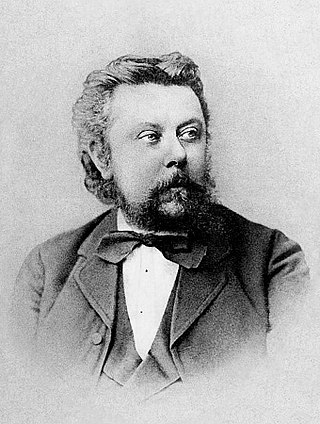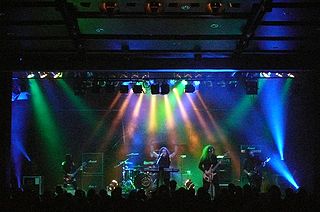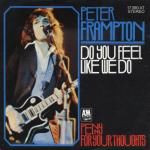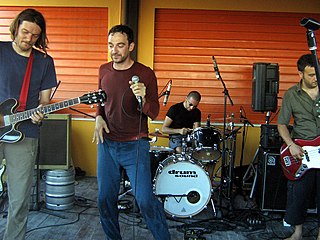
Pictures at an Exhibition is a piano suite in ten movements, plus a recurring and varied Promenade theme, written in 1874 by Russian composer Modest Mussorgsky. It is a musical depiction of a tour of an exhibition of works by architect and painter Viktor Hartmann put on at the Imperial Academy of Arts in Saint Petersburg, following his sudden death in the previous year. Each movement of the suite is based on an individual work, some of which are lost.
In music, the dynamics of a piece are the variation in loudness between notes or phrases. Dynamics are indicated by specific musical notation, often in some detail. However, dynamics markings require interpretation by the performer depending on the musical context: a specific marking may correspond to a different volume between pieces or even sections of one piece. The execution of dynamics also extends beyond loudness to include changes in timbre and sometimes tempo rubato.
John Vivian McVea was an American swing, blues, and rhythm and blues woodwind player and bandleader. He played clarinet and tenor and baritone saxophone.

Virgin Black is an Australian symphonic gothic and doom metal band. The band was signed to The End Records and Germany's Massacre Records, through which it released four albums and one EP. A fifth album, originally planned for release in 2006, was released independently in 2018. As of 2021, they are signed to Australian record label, Dark Escapes Music. Formed in 1995 in Adelaide, they have achieved international acclaim during their career, receiving praise from such magazines as Orkus, Metal Hammer, Legacy and The Village Voice.

"I Will Always Love You" is a song written and originally recorded in 1973 by American singer-songwriter Dolly Parton. Written as a farewell to her business partner and mentor Porter Wagoner, expressing Parton's decision to pursue a solo career, the country single was released in 1974. The song was a commercial success for Parton, twice reaching the top spot of Billboard Hot Country Songs: first in June 1974, then again in October 1982, with a re-recording for The Best Little Whorehouse in Texas soundtrack.

The Symphony No. 2 in E minor, Op. 27 by Russian composer Sergei Rachmaninoff was written from October 1906 to April 1907. The premiere was performed at the Mariinsky Theatre in Saint Petersburg on 26 January 1908, with the composer conducting. Its duration is approximately 60 minutes when performed uncut; cut performances can be as short as 35 minutes. The score is dedicated to Sergei Taneyev, a Russian composer, teacher, theorist, author, and pupil of Pyotr Ilyich Tchaikovsky. The piece remains one of the composer's most popular and best known compositions.
Sergei Prokofiev set to work on his Piano Concerto No. 2 in G minor, Op. 16, in 1912 and completed it the next year. But that version of the concerto is lost; the score was destroyed in a fire following the Russian Revolution. Prokofiev reconstructed the work in 1923, two years after finishing his Piano Concerto No. 3, and declared it to be "so completely rewritten that it might almost be considered [Piano Concerto] No. 4." Indeed its orchestration has features that clearly postdate the 1921 concerto. Performing as soloist, Prokofiev premiered this "No. 2" in Paris on 8 May 1924 with Serge Koussevitzky conducting. It is dedicated to the memory of Maximilian Schmidthof, a friend of Prokofiev's at the Saint Petersburg Conservatory, who had committed suicide in April 1913 after having written a farewell letter to Prokofiev.

Rita Pavone is an Italian-Swiss ballad and rock singer and actress, who enjoyed success through the 1960s.

"Do You Feel Like We Do" is a song by Peter Frampton originally appearing on his Frampton's Camel album that he released in 1973. The song became one of the highlights of his live performances in the following years, and it became one of the three hit singles released from his Frampton Comes Alive! album, released in 1976. The live version was recorded on 14 June 1975 at the Winterland Ballroom in San Francisco. This live version is featured in Guitar Hero 5 and as downloadable content for Rock Band 3. The studio version of the song is available as downloadable content for Rocksmith 2014.

Garland Jeffreys is an American singer and songwriter in rock and roll, reggae, blues, and soul music.

Pleasure Factory is a 2007 Singaporean-Thai docudrama film set in Geylang, the red-light district of Singapore. Directed by Ekachai Uekrongtham, the film was selected for the Un Certain Regard competition at the 2007 Cannes Film Festival.

Getting Home is a 2007 Chinese comedy/drama film directed by Zhang Yang and starring Chinese comedian Zhao Benshan. It is episodic and follows two workers in their 50s, Zhao and Liu. The film opens when Liu unexpectedly dies after a night of drinking and Zhao decides to fulfill a promise to his friend to get him home, beginning a long odyssey from Shenzhen to Chongqing with Liu's corpse on his back. Along the way, Zhao meets a variety of figures, played by several of China's better known character actors.
Fortissimo Films is a Dutch sales, film production company specializing in the production, presentation, promotion and distribution of feature films, founded in 1991 with offices in Amsterdam.
Michael J. Werner is an American film producer.

Perturbazione are an Italian indie pop rock band formed in Rivoli, Italy at the end of the 1980s.
"What Keeps Mankind Alive?" is a song composed by Kurt Weill with lyrics by Bertolt Brecht for their music drama The Threepenny Opera which premiered in Berlin in 1928 at the Theater am Schiffbauerdamm. The title refers to the central line from the finale of act 2, Denn wovon lebt der Mensch?. In the opera, the two stanzas of the strophic piece are sung by Macheath and Mrs Peachum and the final line is sung in fortissimo by the chorus.

Ti conosco mascherina is a double studio album by Italian singer Mina, released on 12 October 1990 by PDU and distributed by EMI Italiana.

"Nessuno" is a 1959 Italian song composed by Antonietta De Simone and Edilio Capotosti. The song premiered at the ninth edition of the Sanremo Music Festival, with a double performance by Wilma De Angelis and Betty Curtis, and placed at the eighth place.

"Fortissimo" is a 1966 song brought to success by Rita Pavone. The music was composed by Bruno Canfora, while the lyrics were written by director and screenwriter Lina Wertmüller, at the time a close collaborator of Pavone, after having directed her in the television miniseries Il giornalino di Gian Burrasca and in the musicarello film Rita the Mosquito. The arrangements of the song are by Luis Bacalov.












